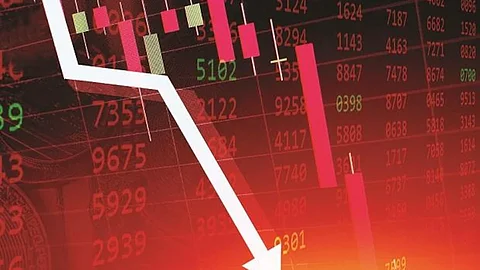

Global stock markets sank further on Monday, continuing the steep declines that rattled investors late last week.
The sell-off, triggered by President Donald Trump’s sweeping tariffs on major trading partners, has renewed fears of a long-term economic downturn and possible recession.
In Asia, trading was particularly turbulent.
Hong Kong’s stock index plummeted 13%, while Taiwan and mainland China dropped 10% and 7%, respectively.
Across the Pacific, Japan’s Nikkei 225 closed down more than 7%, with sell orders hitting so hard that exchange operators briefly stopped trading in Japanese stock futures.
European markets did not escape the sell-off.
The pan-European benchmark slid more than 5%, as concerns grew that trade tensions could freeze deal-making and undercut business confidence.
Banks in Germany and Britain took some of the heaviest hits, with economists warning that continued turmoil might push more investors toward safe-haven assets.
In New York, the S&P 500 is set to open about 3% lower, suggesting it could soon enter an official bear market, defined as a decline of 20% or more from a recent peak.
After its worst two-day drop since the COVID-19 crisis, the S&P 500 closed on Friday down 17.4% from its February high.
Futures on the Nasdaq Composite index, which heavily weights technology companies that have been particularly vulnerable, also indicated potential further losses.
Experts say the market slide stems directly from tariffs announced by the Trump administration.
The historically high levies on a wide range of imports have rattled corporations and prompted foreign governments to respond with stiff penalties of their own.
Over the weekend, President Trump vowed to press on unless other nations paid “a lot of money” to secure tariff relief.
On Sunday evening, Trump reaffirmed his position, saying the market’s decline was a necessary “remedy” to “fix” the existing trade system.
China responded with a 34% tariff on certain American goods, matching the rate Trump imposed on its exports.
A 10% “baseline” tariff also took effect on Saturday on most imports bound for the US, adding to businesses concerns over rising costs.
Analysts at Deutsche Bank pointed out on Monday that they see “no sign yet” of markets finding a bottom.
Signs of economic strain are already emerging.
Several auto manufacturers have announced production pauses overseas, along with domestic job cuts.
Technology firms that rely on global supply chains, including Apple’s key suppliers, have seen their shares tumble.
Consumers, meanwhile, are bracing for higher prices on food, clothing, and other necessities.
Bill Ackman, a prominent hedge fund manager, called for a “90-day time out” on tariffs to prevent a potential “economic nuclear winter.”
British Prime Minister Keir Starmer also cautioned that “the world as we knew it has gone,” urging countries to avoid escalating the trade dispute.
For now, however, investors remain on edge.
The tariffs are set to widen further this week, analysts warn that continued volatility may be the new reality until global leaders find a way to calm tensions and chart a path back to stability.
